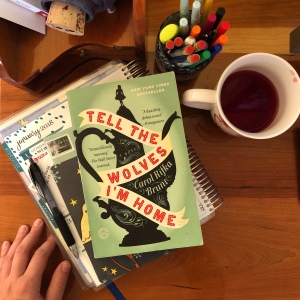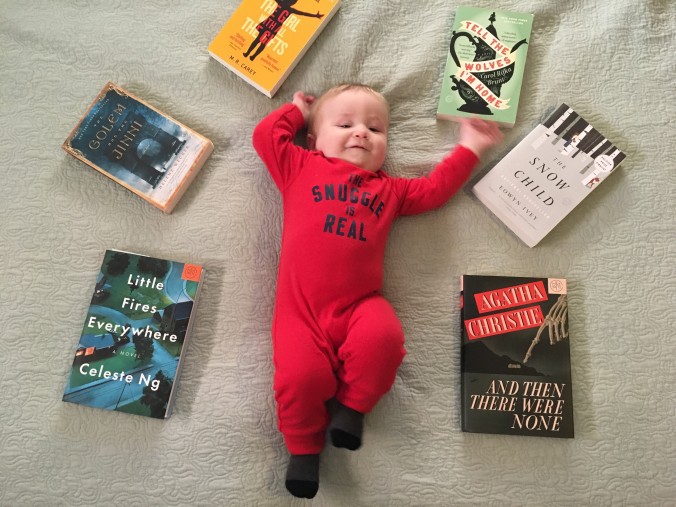Last month, I won a ridiculous amount of giveaways — ten, I believe — on Instagram, BookRiot, and Goodreads. Sadly, I did not win the lottery. Although, it could be argued that books > money . . . right?
Anyway, to the point: one such win was in a giveaway on author Cynthia Robinson’s IG page (@cynthiarobinson2605), in exchange for an honest review on Goodreads/IG/the blogosphere. I received the book from the publisher a mere three days later and got to reading immediately — it’s slated for release February 20.
Birds of Wonder is Robinson’s debut full-length novel. At about 300-some pages, the work of fiction is what I’d consider average in length, but let me tell you — it is chock full of dark characters and twisty plot points. As with many thrillers/mysteries/crime novels of the day, the story is told from multiple perspectives. I enjoy this for a few reasons: it adds a layer of deception and intrigue, it lends credence to unreliable narrators, and it makes the chapters fly by that much more quickly. I’m a self-proclaimed oddball that has developed a weird obsession with breaking reading into chunks. Books with longer chapters sometimes make these chunk-goals hard to achieve what with my increasingly-adventurous baby demanding attention and whatnot, so the shorter, individual narratives featured in books like Birds of Wonder somehow make the reading feel more manageable.

I digress. The novel is told from the perspective of six starkly different individuals: Beatrice, high school teacher and stiflingly ambitious and cheery widow; Jes, lead investigator on the case and daughter to aforementioned theater teacher; Liam, local vintner and child welfare lawyer; Edward, creep-of-all-creeps and obsessive artist; Conner, aspiring photographer and local student; and Waldo, known schizophrenic and laborer at Liam’s vineyard.
The six compelling narratives are strung together to cover the course of a few days, when a mutilated body is found on Liam’s property early Saturday morning. Unfortunately, the body belongs to Amber, one of Beatrice’s students and the star of her upcoming school theater production. Beatrice, busybody that she is, naturally spends the next couple of days in a state of anguish over the loss of her star, though whether her grief is more heavily concentrated on the tragic loss of a young life or the tragic loss of her leading actress is a bit fuzzy at times. Meanwhile, Jes scrambles to find the murderer before her misogynistic and repressive colleagues are able to, hell-bent on proving herself valuable despite her “drawback” of a college education. As the case winds to a close, everybody is in for a stunning revelation. EVERYBODY.
The Good: One of my favorite things about this novel is how marvelously crafted Beatrice’s character is. She. Drove. Me. Bonkers. And, if I’m being honest, all of the characters were very well-constructed; it’s just that Beatrice and Edward kind of hogged the limelight. Their beings were far more vivid than the others and I was in turns repulsed and transfixed by the two. I was also appreciative of the topics present in this mystery: sex trafficking, drug abuse, infidelity, loyalty, foster care, self-fulfilling prophesies . . . at times, it felt like there was too much that Robinson was trying to cram into this book; but overall, the themes worked well together. Oh! And another thing — Robinson did a great job of characterizing the strained relationship between a mother and daughter who have a very one-sided acquaintance. Beatrice’s insufferable interjection of herself into Jes’ life was so very reminiscent of small-town family life. I shuddered for Jes on a number of occasions.
The Okay: In the beginning, some of the descriptions were laboriously repetitive in their allusion to plants and birds and so on. I found myself wishing a few things were cut so we could get past the flowery descriptions and into the meat of the story. In short, it got off to a bit of a slow start. Additionally, as mentioned previously, it sometimes felt like the author was trying to accomplish too much in the short span of 300 pages/two days.
The Bad: Waldo’s narrative was just hard to get my head around. Sometimes it was distracting. Maybe I am dense (very good possibility) but I usually had to read his section more than once and was left thinking, Wait — what? I realize this is due largely to his unhinged nature; it just didn’t quite work for me. Fortunately, his narrative formed a very small part of the novel.
The Verdict: 3.5/5 stars. Read this one for the creep factor (here’s looking at you, Edward) and the family drama.
 Told in the style of narrative nonfiction — think storytelling rather than textbook — The Stowaway is a tale of the resilience of the human spirit, a kind of patriotic zest for life that seems so prevalent in the 30s and 40s and so absent today. (I can’t be the only one that feels this way, right? Like the recent decades are far less resilient or driven to less ambitious heights?) As with most narrative nonfiction, I found the cast of characters a bit hard to keep track of at times (which is natural, since there are so many more players in real life than in fiction). While I enjoyed the first half of the novel, I felt like things kind of lost steam in the second half.
Told in the style of narrative nonfiction — think storytelling rather than textbook — The Stowaway is a tale of the resilience of the human spirit, a kind of patriotic zest for life that seems so prevalent in the 30s and 40s and so absent today. (I can’t be the only one that feels this way, right? Like the recent decades are far less resilient or driven to less ambitious heights?) As with most narrative nonfiction, I found the cast of characters a bit hard to keep track of at times (which is natural, since there are so many more players in real life than in fiction). While I enjoyed the first half of the novel, I felt like things kind of lost steam in the second half.



